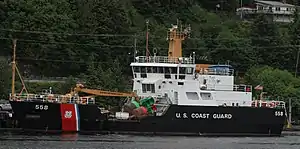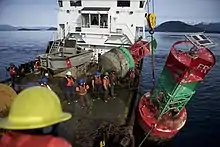USCGC Anthony Petit (WLM-558)
USCGC Anthony Petit (WLM-558) is a Keeper-class Coastal Buoy Tender of the United States Coast Guard. Launched in 1999, she has served her entire career maintaining navigational aids in Southeast Alaska.
 USCGC Anthony Petit | |
| History | |
|---|---|
| Name: | Anthony Petit |
| Namesake: | The keeper of the Scotch Cap lighthouse |
| Operator: | US Coast Guard |
| Builder: | Marinette Marine Corporation |
| Launched: | January 30, 1999 |
| Completed: | July 1, 1999 |
| Homeport: | Ketchikan, Alaska |
| Identification: |
|
| Status: | Active |
| General characteristics | |
| Type: | Keeper Class Buoy Tender |
| Tonnage: | 903 GT |
| Length: | 175 ft (53.3 m) |
| Beam: | 36 ft (11.0 m) |
| Draft: | 8.5 ft (2.6 m) |
| Installed power: | 2 x Caterpillar 3508 TA diesels |
| Propulsion: | 2 x Ulstein/Rolls Royce 360 degree steerable Z-Drives plus 500 HP Electric Bow Thruster |
| Speed: | 12 knots (22 km/h; 14 mph) |
| Range: | 2000 nautical miles at 10 kn |
| Capacity: | 200 DWT |
| Crew: | 24 (1 Warrant Officer, 23 Enlisted) |
Construction
Anthony Petit was built by Marinette Marine Corporation in Marinette, Wisconsin. She was the eighth of the fourteen Keeper-class vessels completed. The contract price for the entire class was $220 million, suggesting that the original cost of Anthony Petit was approximately $15.7 million. The ship was launched on January 30, 1999 into the Menominee River. Speakers at the christening ceremony included Alaska Senator Frank Murkowski, and Coast Guard Commandant Admiral James Loy.[1]
The hull is built of welded steel plate. The ship is 175 feet (53 m) long and has a beam of 36 feet (11 m).[2] Her draft is 8.5 feet (2.6 m).
Keeper-class ships, including Anthony Petit, use z-drives for propulsion instead of fixed propellers and rudders. The z-drives may be synchronized to point in the same direction when underway. The ship is steered by changing the direction of the thrust. For fine maneuvering or station keeping while working on a buoy, the two z-drives may be pointed in different directions. These are combined with a bow thruster to allow the ship to remain at the same spot in the sea, a capability known as dynamic positioning. The two z-drives are powered by two Caterpillar 3508 TA Diesel engines.[3]
Electrical power is provided by three Caterpillar 3406 generators.[4]
The ship has a 42-foot long boom crane capable of lifting 10 tons onto her buoy deck. This allows floating buoys to be hoisted aboard for maintenance. The buoy deck is 1,335 square feet in area.[4]
Anthony Petit, as all Keeper-class buoy tenders, has an ice-strengthened hull so that she may continue to service navigational aids in light ice conditions. There is an "ice-belt" of thicker steel at the ship's waterline to resist ice damage to the hull. The bow is shaped to ride up over the ice and crush it with the ship's weight. Her performance in ice conditions varies with the quality of the ice, the amount of power applied, and other factors. At full-throttle, the ship can maintain a speed of 2 knots in smooth ice 12 inches (30 cm) thick, but various operational considerations argue against breaking ice this thick.[5]
Anthony Petit has one ship's boat, an 18 feet (5.5 m) long Cutterboat ATON – Medium (CB-ATON-M). This boat was estimated to cost $210,000.[6]
The ship's namesake is U.S. Coast Guard Chief Boatswain's Mate Anthony Petit, the keeper of the Scotch Cap lighthouse on the west end of Unimak Island in the Aleutians. Petit and four other members of his crew were killed in a tsunami which destroyed the lighthouse on April 1, 1946.[7]
Operational history

After her launch and sea trials, Anthony Petit sailed down the Great Lakes, the Saint Lawrence Seaway, and through the Panama Canal to reach Ketchikan, Alaska, her homeport for her entire career. She arrived in January 2000.[8] The ship is stationed at Coast Guard Base Ketchikan. She replaced USCGC Planetree at this station.[9] Her primary mission is maintaining 274 fixed and floating aids to navigation in Southeast Alaska.[10]
The ship has also performed other Coast Guard missions. Anthony Petit participated in search and rescue activities as with the charter boat Fishin' Fool in 2002,[11] fishing vessel Yvonne Denise in 2005,[12] the ferry Lituya in 2009,[13] and the fishing vessel Tsimshian Lady in 2017.[14]
Anthony Petit has trained extensively on oil spill containment. She has participated in several joint United States-Canada exercises to prepare for a possible spill in the Dixon Entrance area. She has deployed the vessel of opportunity skimming system (VOSS) several times in training.[15][16][17]
References
- "Federal Contracts Spark Success". Green Bay Press-Gazette. January 29, 1999.
- "175-foot Keeper class > United States Coast Guard > Display". www.uscg.mil. Retrieved 2020-05-07.
- The Cutters, Boats, and Aircraft of the United States Coast Guard (PDF). United States Coast Guard. 2018. p. 138.
- DiNicola, CDR Peter J. (July–September 1997). "The New Keeper Class WLM". Proceedings of the Maritime Safety Council. 54: 12–19.
- 175-ft WLM Keeper Class Guide for Ice Operations (PDF). United States Coast Guard. 2011.
- Boat Expenditure Plan (PDF). US Coast Guard. 2015.
- "Congressional Record (Bound Edition), Volume 145 (1999), Part 1 - BMC ANTHONY LAWRENCE PETIT AND THE SCOTCH CAP LIGHTHOUSE". www.govinfo.gov. Retrieved 2020-05-06.
- "Cutter Anthony Petit News". www.marinelink.com. Retrieved 2020-05-06.
- "USCG's Newest Cutter Arrives in Ketchikan". MarineLink. 2000-01-27. Retrieved 2020-06-28.
- Singleton, Billy (August 11, 2018). "Command change for USCG Cutter Anthony Petit: Schaffer retires, relieved by Boss". Ketchikan Daily News. Retrieved 2020-05-06.
- "Cutter Anthony Petit Crew Saves Charter Vessel". www.sitnews.org. August 24, 2002. Retrieved 2020-05-06.
- 17th COAST GUARD DISTRICT ENFORCEMENT REPORT (PDF). Juneau, Alaska: US Coast Guard. 2005. pp. Table 1.
- "Alaska State Ferry breaks free from mooring, aground | Coast Guard News". Retrieved 2020-05-06.
- "Coast Guard rescues fishing vessel crew near Tamgas Harbor, Alaska | Coast Guard News". Retrieved 2020-05-06.
- "U.S. and Canadian Coast Guards Conduct International Oil Spill Training". www.sitnews.us. September 24, 2007. Retrieved 2020-05-06.
- "Canadian, U.S. Coast Guard conduct oil spill response drill in Ketchikan | Coast Guard News". Retrieved 2020-05-06.
- Hnatow, LCDR Jennifer (Summer 2013). "Arctic Oil Spill Response Training" (PDF). Coast Guard Proceedings. 70: 46–49.